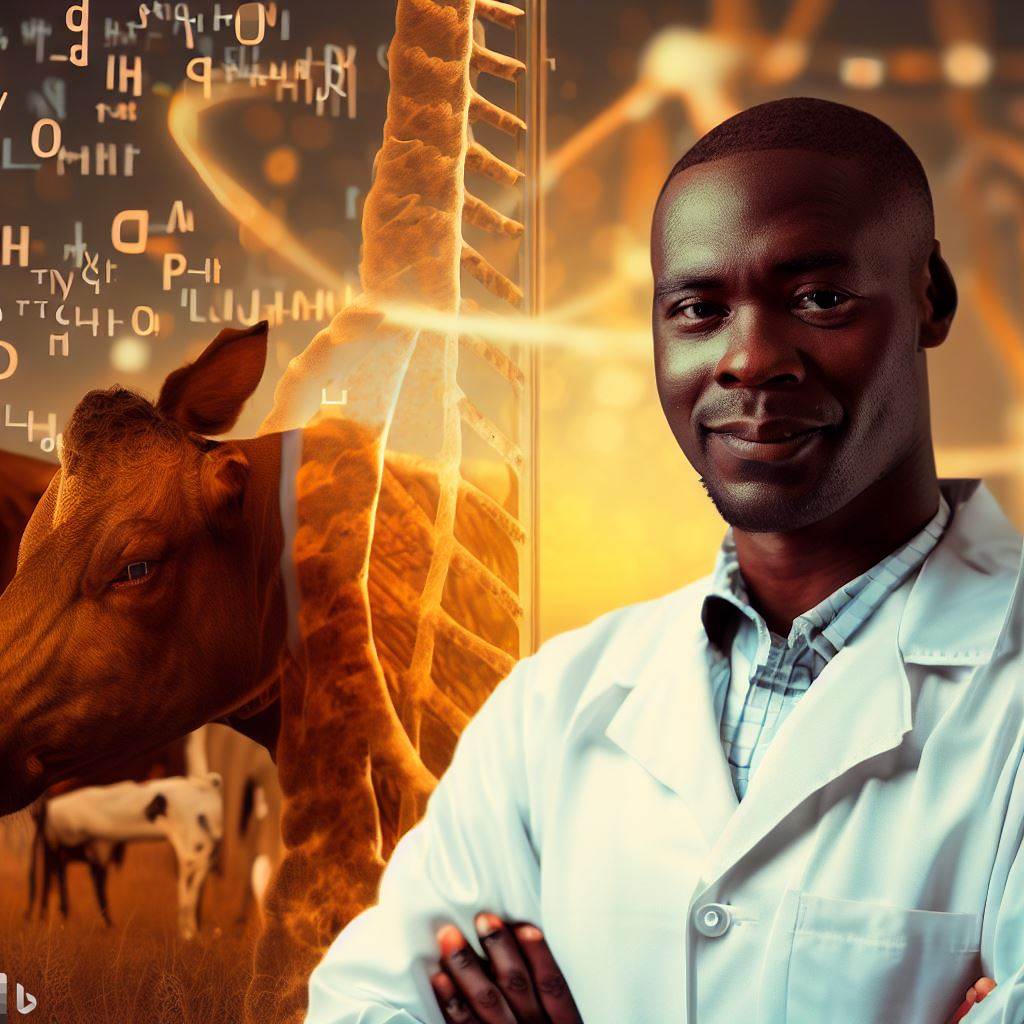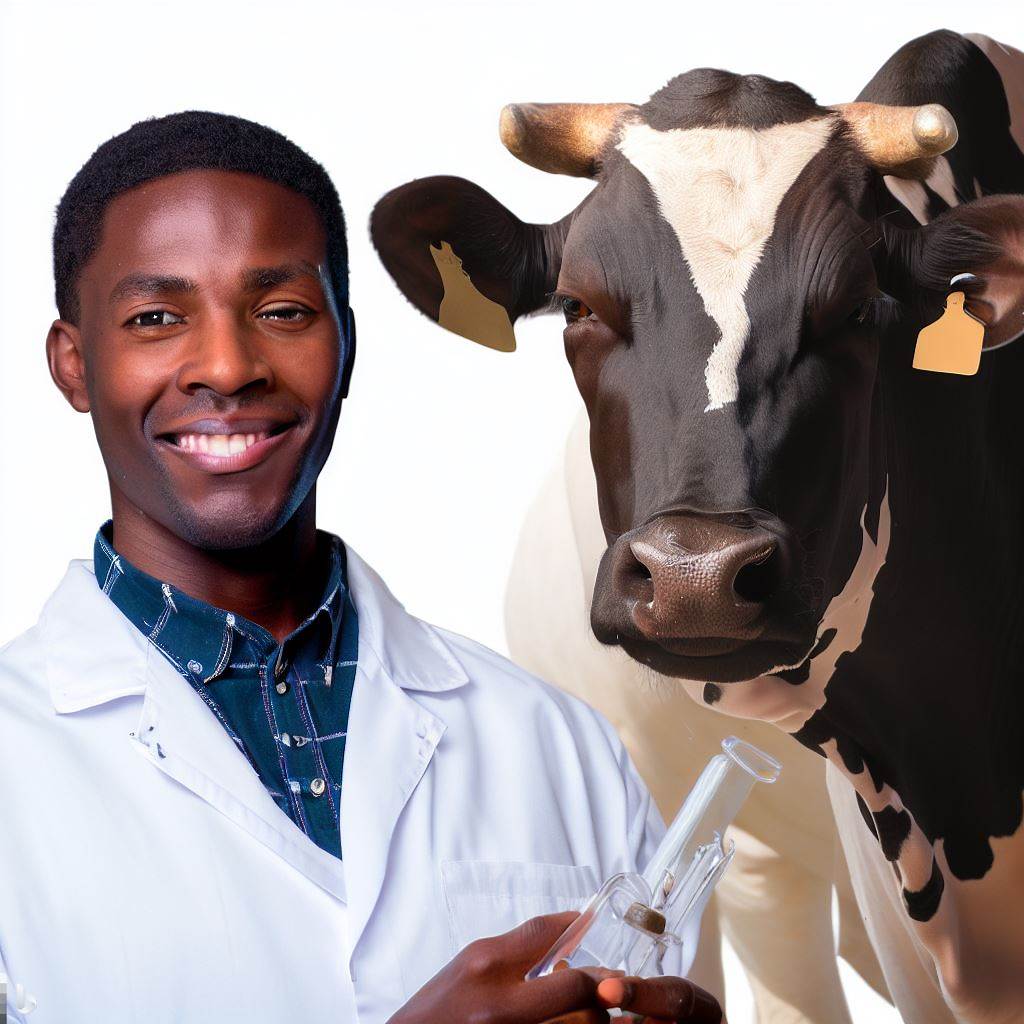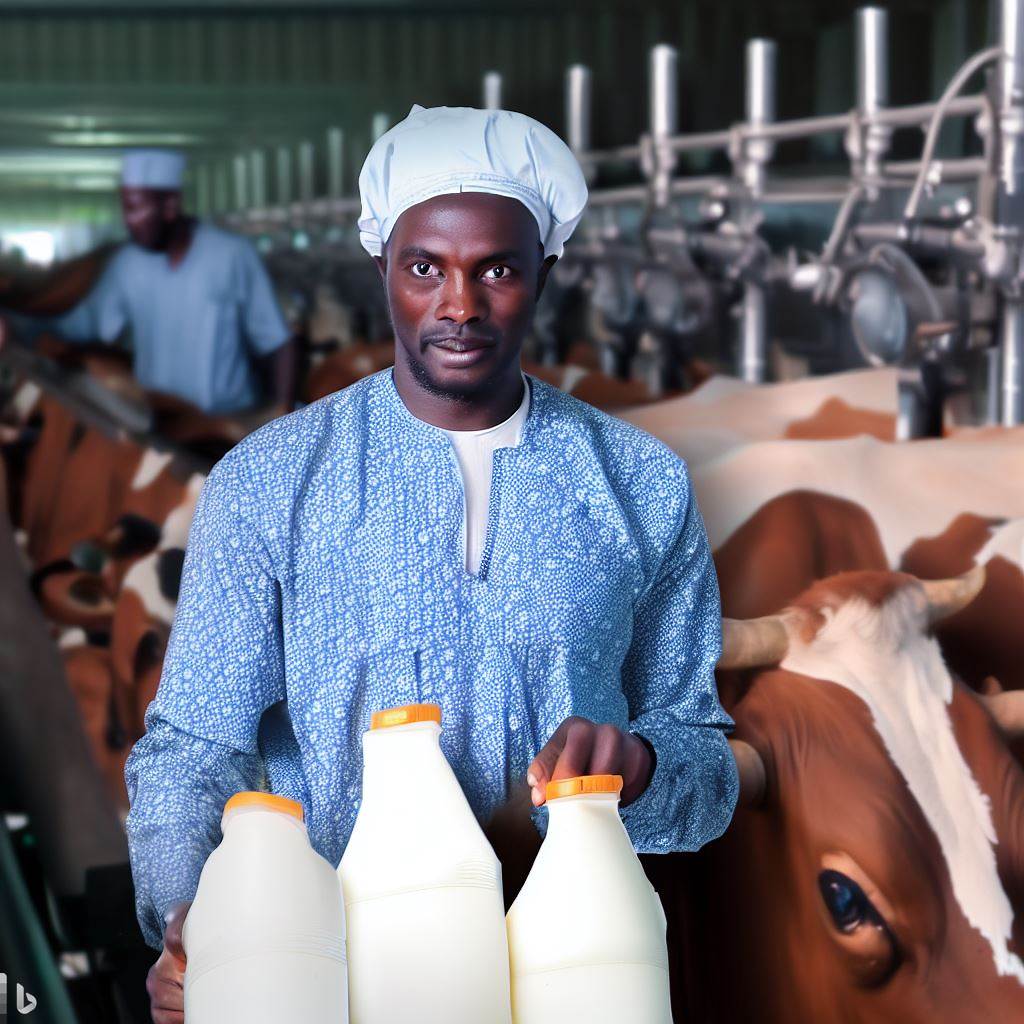Introduction
Animal genetics is a crucial field in Nigeria, and as an animal geneticist, my daily life revolves around the study and application of genetic principles in animals.
With a passion for animals and a curiosity about their genetic makeup, I contribute to advancements in livestock breeding and disease prevention.
This blog post will delve into a typical day in my life, shedding light on the responsibilities and challenges I face.
Starting my day early, I head to the research lab, where I conduct various experiments to analyze and interpret animal DNA.
By studying the genetic variations within different animal populations, I contribute to the development of breeding programs that enhance desirable traits in livestock, such as disease resistance and improved productivity.
Apart from the laboratory work, I also spend time in the field, working closely with farmers and livestock breeders.
Through my expertise, I offer advice on selecting breeding stock and implementing appropriate genetic management strategies.
This interaction with farmers enables me to witness firsthand the impact of genetic interventions on improving the quality and productivity of their animals.
However, being an animal geneticist in Nigeria comes with its challenges. Limited funding and inadequate infrastructure can hamper research and the implementation of advanced genetic techniques.
Nevertheless, I remain motivated by the potential benefits that genetic advancements can bring to Nigeria’s agricultural sector.
In the end, as an animal geneticist, my work revolves around improving animal breeding programs, disease prevention, and enhancing livestock productivity.
Through both laboratory research and fieldwork, I contribute to the growth of Nigeria’s agricultural sector, ensuring the sustainable development of animal genetic resources.
Overview of the Animal Geneticist’s Role
As an animal geneticist, my responsibilities and duties are crucial in ensuring the improvement of livestock productivity and disease resistance in Nigeria.
Through my work, I contribute to sustainable agriculture and food security in the country.
Responsibilities and Duties of an Animal Geneticist
Conducting extensive research to understand animal genetics and develop new breeding techniques. Analyzing genetic data to identify valuable traits and characteristics in livestock.
Designing and implementing breeding programs to enhance animal traits like growth rate and milk production.
Evaluating the genetic makeup of animals to identify genetic disorders or susceptibility to diseases. Collaborating with veterinarians and animal breeders to create breeding strategies.
Monitoring and evaluating the success of breeding programs through data analysis and performance testing.
Promoting and educating farmers and breeders about the importance of genetic improvement.
Significance of Animal Genetics in Nigeria
Animal genetics plays a vital role in improving livestock productivity and disease resistance in Nigeria. By understanding and manipulating genetic traits, we can enhance the quality and quantity of animal products.
Nigeria’s economy heavily relies on agriculture, and a significant portion of this sector involves livestock production.
Animal genetics allows us to breed animals that are more resistant to diseases prevalent in the country, reducing the risk of economic losses for farmers.
Genetic improvement also enhances traits like growth rate, feed efficiency, and reproductive performance, leading to increased productivity in the livestock industry.
This, in turn, contributes to the economic growth and development of Nigeria.
Impact of Animal Genetics on Sustainable Agriculture and Food Security
Animal genetics plays a crucial role in achieving sustainable agriculture and food security in Nigeria.
By breeding animals with desirable traits, we can produce more nutritious food while minimizing the use of resources.
By improving livestock genetics, we can achieve higher milk and meat yields, ensuring an adequate supply of protein-rich food for the population.
This helps address malnutrition and hunger issues, particularly in rural areas where animal products are essential for the diet.
Additionally, genetic improvement reduces the dependency on harmful chemicals and antibiotics in livestock farming.
By breeding animals with natural disease resistance, we can reduce the need for disease prevention through medication, promoting environmentally-friendly and sustainable agricultural practices.
Furthermore, animal genetics contributes to the conservation of indigenous livestock breeds, which are adapted to unique local environments and possess valuable traits such as heat tolerance and resilience to diseases.
Preserving these breeds ensures the preservation of biodiversity and sustainability in the agricultural sector.
In fact, as an animal geneticist in Nigeria, my role is crucial in improving livestock productivity, enhancing disease resistance, and promoting sustainable agriculture.
Through genetic research and breeding strategies, we contribute to food security, economic growth, and environmental sustainability in the country.
Read: Role of Animal Geneticist in Nigeria’s Agro-economy
Education and Training
To become an animal geneticist in Nigeria, a strong educational background is necessary.
One must have a minimum of a bachelor’s degree in a relevant field of study, such as animal science, genetics, or biology.
Advanced degrees like a master’s or a PhD in animal genetics are highly recommended for career advancement.
Courses related to animal genetics include genetics, molecular biology, biochemistry, and animal breeding. Understanding the principles of genetics, inheritance, and DNA analysis is essential for this profession.
These courses provide the foundation for working with and analyzing the genetic makeup of animals. Knowledge of statistics and quantitative genetics is also necessary to interpret research data accurately.
Animal geneticists often engage in research projects, so knowledge of research methodology is an asset. Hands-on experience with laboratory techniques, such as DNA extraction and PCR, is important.
Additional training in animal handling, reproductive technologies, and biotechnology is highly beneficial for this profession.
Participating in internships or research assistant positions can provide practical experience in the field.
Attending conferences and workshops related to animal genetics helps in staying updated with advancements.
Some animal geneticists obtain certifications from professional organizations to enhance their credibility and expertise.
Certifications like the Certified Animal Geneticist (CAG) designation demonstrate a higher level of competency.
Continuing education is crucial in this field to keep up with the ever-evolving field of genetics.
Read: Inspiring Stories of Nigerian Animal Geneticists
Daily Routine and Activities
As a Nigerian animal geneticist, my days are filled with a variety of tasks and activities that contribute to the field of genetics and benefit both farmers and animals. Here is a glimpse into my typical day:
I start my day early in the morning, around 6 AM, with a cup of coffee to energize myself for the day ahead.
One of the first tasks on my agenda is data analysis. I review and analyze the data collected from various research projects.
Next, I engage in genetic research. This involves studying the genetic makeup of different animal species and identifying valuable traits.
After conducting research, I often spend time in the laboratory. Here, I perform experiments to further deepen my understanding of animal genetics.
Importance of collaborating and interacting with farmers, veterinary professionals, and researchers
Collaboration plays a crucial role in my work. Throughout the day, I communicate and exchange ideas with fellow researchers and professionals.
Interacting with farmers is an essential part of my daily routine. I visit farms to understand their needs and educate them about genetic improvement strategies.
Another crucial aspect of my work is collaborating with veterinary professionals. Together, we develop solutions to genetic disorders and health issues in animals.
Attending conferences and seminars is a regular part of my schedule. By participating in such events, I stay updated on the latest advancements in the field.
In addition to my core duties, as a geneticist, I also contribute to publishing scientific papers and articles to share my findings with the wider scientific community.
Lastly, I end my day by catching up on the latest research papers and scientific literature. This helps me stay informed and inspired to continue making advancements in animal genetics.
Being an animal geneticist in Nigeria is a fulfilling and challenging role.
By dedicating my time to data analysis, genetic research, laboratory work, and collaboration, I can make a positive impact on both animal welfare and the livelihoods of farmers.
Read: Challenges Faced by Animal Geneticists in Nigeria

Challenges and Opportunities
As the sun rises over Nigeria, animal geneticists gear up for a day of challenges and opportunities.
Limited resources and funding continually test their dedication. Yet, within these hurdles lie avenues for growth and impact.
Inadequate research facilities and equipment create obstacles, but they strive to make the most of what’s available. Funding constraints impede innovation, pushing them to seek alternative financial avenues.
Amidst these challenges, the field offers promising prospects. Collaborations with international institutions open doors for knowledge exchange and access to advanced technology.
Animal geneticists can diversify their expertise by branching into fields like biotechnology and bioinformatics.
These professionals play a pivotal role in transforming Nigeria’s agricultural landscape. By breeding disease-resistant and high-yielding livestock, they bolster food security.
Through selective breeding, they address environmental challenges by promoting resilient and adaptable animal species.
In the quest for sustainable farming, animal geneticists facilitate the conservation of indigenous livestock breeds, preserving biodiversity.
They empower local farmers with improved breeds, enhancing their livelihoods.
Educational institutions and research centers provide platforms for nurturing future geneticists. Mentorship programs bridge the gap between seasoned professionals and emerging talents.
In general, a day in the life of a Nigerian animal geneticist encapsulates both trials and triumphs.
Their unwavering commitment, coupled with creative problem-solving, can revolutionize agriculture, ensuring a brighter future for Nigeria.
Read: Exploring Animal Geneticist Salary Scale in Nigeria
Achievements and Impact
Notable achievements of Nigerian animal geneticists
Here are some success stories and notable achievements of Nigerian animal geneticists:
- Improved Livestock Breeds: Nigerian animal geneticists have successfully bred and developed improved livestock breeds, such as high-yielding dairy cows and disease-resistant poultry.
- Enhanced Genetic Traits: Through their work, animal geneticists in Nigeria have been able to enhance desirable genetic traits in livestock, resulting in improved productivity, adaptability, and overall quality of animals.
- Preservation of Indigenous Breeds: These geneticists have played a crucial role in preserving and conserving indigenous livestock breeds that are well-suited to Nigeria’s climate and environment.
This helps maintain biodiversity and cultural heritage. - Disease Resistance: By studying animal genetics, Nigerian researchers have developed livestock breeds resistant to common diseases prevalent in the country.
This has significantly reduced economic losses for farmers and increased food security. - Capacity Building: Nigerian animal geneticists have been actively involved in training and mentorship programs, equipping local farmers and researchers with the knowledge and skills needed for effective livestock breeding and genetic improvement.
Impact of their work
The impact of their work has been highly beneficial for livestock breeding and genetic improvement in Nigeria:
- Increased Agricultural Productivity: The improved livestock breeds developed by Nigerian animal geneticists have contributed to increased agricultural productivity and food production in the country.
Farmers now have access to high-yielding animals, enhancing their income and livelihoods. - Market Competitiveness: The enhanced genetic traits in animals have made Nigerian livestock more competitive in local and international markets.
This has opened up opportunities for export and increased foreign exchange earnings for the country. - Poverty Alleviation: Livestock rearing is a significant source of income for many Nigerians.
The efforts of animal geneticists have led to increased productivity and profitability in the livestock sector, helping alleviate poverty among farmers. - Environmental Sustainability: By focusing on breeding livestock that are well-adapted to Nigeria’s climate and environment, animal geneticists have contributed to sustainable agricultural practices.
This reduces the need for excessive resource usage and promotes ecological balance.
Ongoing research projects and initiatives contributing to the field of animal genetics in Nigeria
There are several ongoing research projects and initiatives contributing to the field of animal genetics in Nigeria:
- Marker-Assisted Selection: Nigerian researchers are employing marker-assisted selection techniques to identify and select animals with desired genetic traits more efficiently. This enables faster and more precise breeding programs.
- Genomic Studies: Ongoing genomic studies are unraveling the genetic makeup of various livestock species in Nigeria.
This knowledge aids in understanding the genetic basis of desirable traits and provides valuable information for breed improvement. - Crossbreeding Programs: Animal geneticists are involved in crossbreeding programs to combine the strengths of different breeds and develop superior hybrid animals.
This enhances productivity and genetic diversity in Nigerian livestock. - Capacity Development: Various institutions in Nigeria are actively working to build the capacity of researchers and farmers in the field of animal genetics.
Workshops, training programs, and collaborative research projects are being conducted to enhance expertise and knowledge-sharing.
Basically, Nigerian animal geneticists have made significant achievements in improving livestock breeds, enhancing genetic traits, and preserving indigenous breeds.
Their work has positively impacted livestock breeding and genetic improvement in Nigeria, leading to increased agricultural productivity, market competitiveness, and poverty alleviation.
Ongoing research projects and initiatives continue to contribute to the field of animal genetics, ensuring sustainable development and a thriving livestock industry in the country.
Conclusion
Animal genetics plays a crucial role in Nigeria’s agricultural and food security. Animal geneticists are at the forefront of shaping sustainable agriculture practices and ensuring adequate food supply in the country.
Their work is essential in improving animal breeds, enhancing productivity, and ensuring the health and resilience of livestock.
To support ongoing efforts in animal genetics research, it is vital to encourage readers to explore this career path.
Animal geneticists hold the key to advancements in agriculture and can make a significant impact on Nigeria’s economy and food security.
By choosing this career, individuals can contribute to the development of better livestock breeds and ultimately improve Nigeria’s agricultural landscape.
Animal genetics research is not just a job; it is a critical field that affects the well-being of the nation.
Publish Your Professional Profile, Business or Brand
Showcase your expertise, gain trust, and boost visibility instantly on Professions.ng.
Publish NowBy investing in animal genetics and supporting ongoing research, we can secure a sustainable future for Nigeria’s agriculture and food security.
Let’s explore this career path and contribute to the invaluable work of Nigerian animal geneticists.




